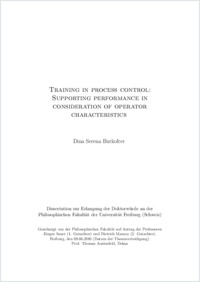Training in process control : supporting performance in consideration of operator characteristics
- Burkolter, Dina
- Sauer, Jürgen (Degree supervisor)
- Manzey, Dietrich (Degree supervisor)
-
09.06.2010
148 p
Thèse de doctorat: Université de Fribourg, 2010
English
This doctoral thesis investigated how training can best support process control performance in consideration of individual differences, i.e. operator characteristics. Process control can be found in industries that control large chemical, energy or thermal processes and is highly safety-critical. The research question was approached through experimental studies conducted with a simulated process control task. Study I investigated the relationship between operator characteristics and process control performance. Study II replicated and extended these findings by analyzing the relation between the same and additional operator characteristics and process control performance. The focus of study III was on the comparison of three training approaches designed to enhance process control performance. Study IV aimed at applying a novel measure of structural knowledge to test its potential as a training outcome in process control. Taken together, the results show that effects of operator characteristics and training methods on performance differ with respect to the two main tasks of process control–system control and fault finding. Hence, one needs to consider operator characteristics and design training interventions according to each of the subtasks.
- Faculty
- Faculté des lettres et des sciences humaines
- Department
- Département de Psychologie
- Language
-
- English
- Classification
- Psychology
- Notes
-
- Ressource en ligne consultée le 29.06.2010
- License
-
License undefined
- Identifiers
-
- RERO DOC 19837
- URN urn:nbn:ch:rero-002-109170
- RERO R005477436
- Persistent URL
- https://folia.unifr.ch/unifr/documents/301629
Statistics
Document views: 230
File downloads:
- Texte intégral: 214
